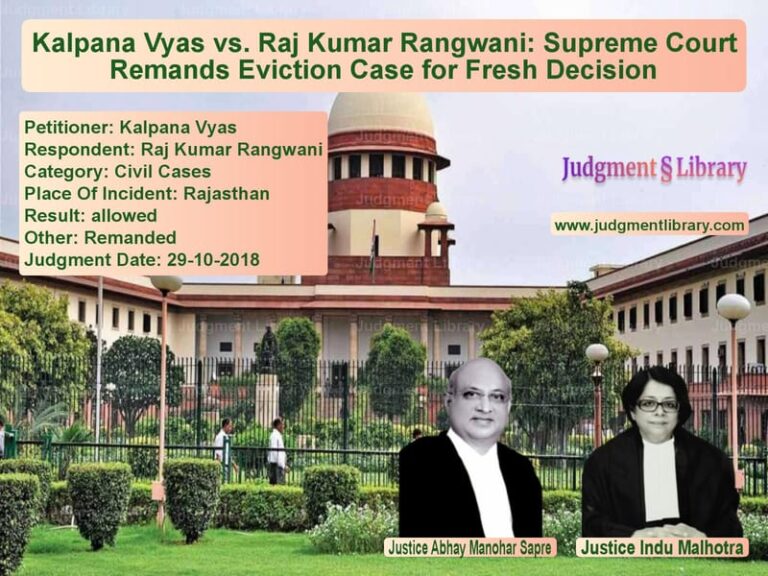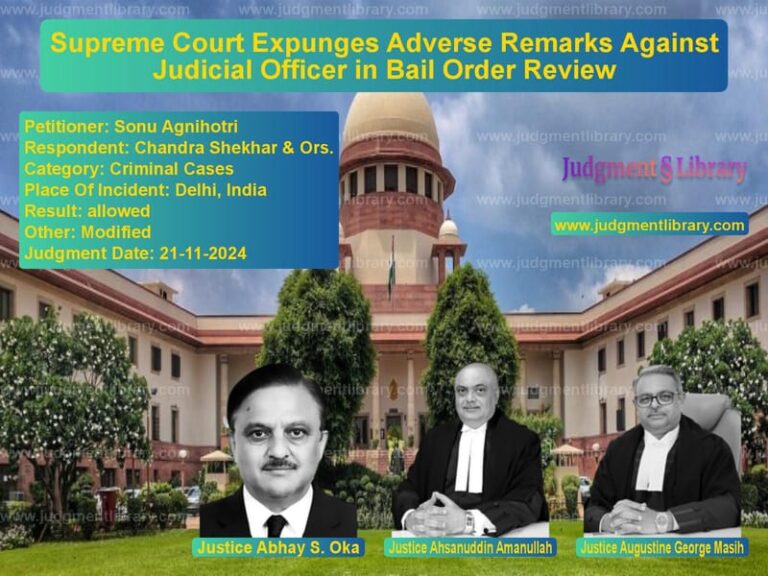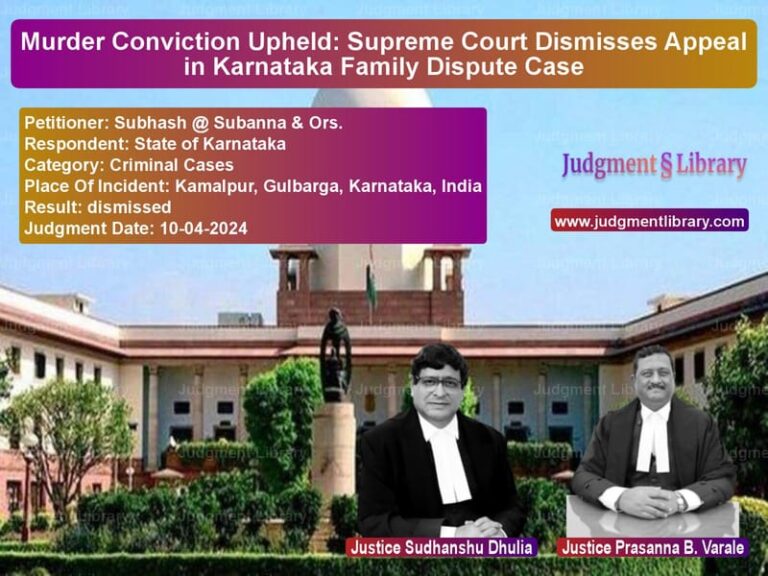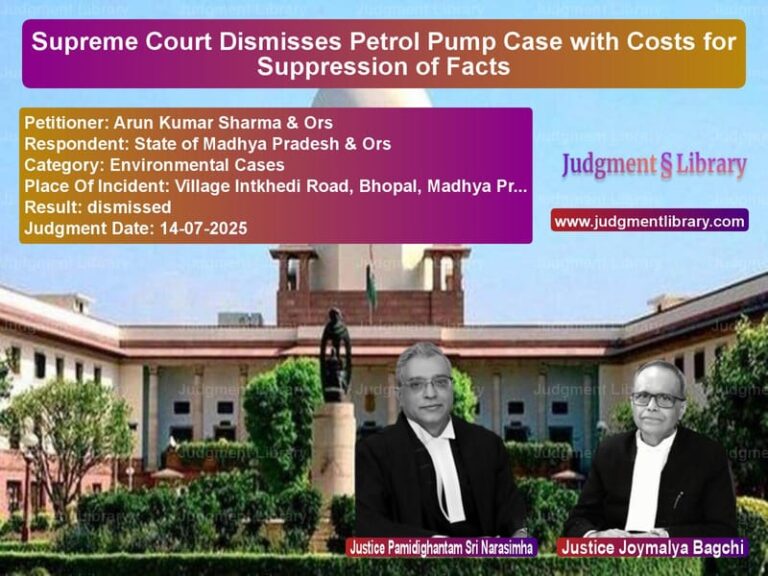Eviction and Bona Fide Requirement: Supreme Court’s Ruling on Bhupinder Singh Bawa vs. Asha Devi
The Supreme Court of India, in the case of Bhupinder Singh Bawa vs. Asha Devi, addressed an important issue regarding the eviction of tenants on the grounds of bona fide requirement under the Delhi Rent Control Act, 1958. The key question was whether the landlady could evict the tenant for the bona fide requirement of her son, who sought the premises for his business, despite the availability of alternative accommodations.
The appellant, Bhupinder Singh Bawa, was a tenant of the premises owned by the respondent, Asha Devi. The respondent sought eviction of the appellant under Section 14(1)(e) of the Delhi Rent Control Act, claiming that her son required the premises to run his sanitary and hardware business. The appellant contested the claim, asserting that there were alternative properties available for the business. The matter was heard in both the Rent Controller and the High Court, which upheld the eviction. The appellant appealed the decision to the Supreme Court.
Background of the Case
The appellant, Bhupinder Singh Bawa, had been occupying the premises at C-1 (old property No. 285), Basai Dara Pur, Sharda Puri, Ring Road, New Delhi, under a rent deed executed on 20.07.1989. The respondent, Asha Devi, acquired the property through a registered sale deed in 2002 and sought eviction of the appellant under Section 14(1)(e) of the Delhi Rent Control Act. She claimed that her son, Vaibhav Maheshwari, who had completed his MBA in 2011, needed the premises for his business.
The appellant countered the eviction petition by arguing that the respondent’s son was already employed as a Director in a company and that there were alternative properties available for the business. These properties included several owned by the respondent’s husband and the company M/s. Jaishree Granites Pvt. Ltd., which could serve the purpose. The Rent Controller dismissed the appellant’s arguments, and the High Court upheld the eviction order. The matter was then brought before the Supreme Court for further adjudication.
Key Legal Issues
The Supreme Court considered the following key legal issues:
- Whether the respondent had established the bona fide requirement of the premises for her son’s business under Section 14(1)(e) of the Delhi Rent Control Act.
- Whether the alternative accommodation suggested by the appellant was suitable for the respondent’s son to run his business.
- Whether the appellant’s claims of hardship were sufficient to prevent eviction.
Petitioner’s Arguments
The appellant, Bhupinder Singh Bawa, argued:
- The respondent had not demonstrated that the premises were required for the bona fide need of her son’s business.
- Several alternative accommodations were available for the respondent’s son to run his business, including properties owned by the respondent’s husband and the company.
- The respondent’s son was already employed as a Director in M/s. Jaishree Granites Pvt. Ltd. and earned a monthly salary of Rs. 50,000, which did not justify the need for the premises.
- Allowing eviction without considering the availability of alternative accommodation would cause undue hardship to the appellant.
Respondent’s Arguments
The respondent, Asha Devi, countered the appellant’s arguments by stating:
- Both the Rent Controller and the High Court had rightly found that the respondent’s son required the premises for his business.
- The appellant’s claim of alternative accommodation was not valid, as the proposed properties were either unsuitable or already in use for other purposes.
- The law does not prevent the landlord from requesting eviction to facilitate the business of their son, especially when other alternatives do not meet the needs of the business.
- The appellant’s hardship did not outweigh the respondent’s legitimate need for the premises, and eviction was warranted under the law.
Supreme Court’s Observations
The Supreme Court made the following key observations in the case:
1. Bona Fide Requirement
The Court observed that the bona fide requirement of the landlord was a matter of fact to be determined by the courts. The respondent had provided sufficient evidence that her son’s business needed a prime location, which the suit premises offered. The Court noted that the law allowed the landlord to decide the suitability of the premises for their son’s business.
2. Suitability of Alternative Accommodation
The Court reviewed the alternative accommodations suggested by the appellant and found that they were either unsuitable or already occupied for other purposes. The Court emphasized that the law did not require the respondent to accept any accommodation, even if available, if it was not suitable for her son’s business.
3. Hardship of the Appellant
The Court considered the appellant’s claim of hardship but found that the hardship caused to the landlord by denying eviction outweighed the appellant’s hardship. The appellant had been living in the premises for a long time but had no legal claim to prevent the eviction in light of the respondent’s bona fide requirement.
Final Judgment
The Supreme Court ruled in favor of the respondent and upheld the eviction order. The Court’s key findings were:
- The respondent had established the bona fide requirement of the premises for her son’s business.
- The alternative accommodation suggested by the appellant was either unsuitable or already occupied.
- The appellant’s hardship did not outweigh the respondent’s need for the premises.
Judgment Outcome: Appeal dismissed, eviction order upheld.
Don’t miss out on the full details! Download the complete judgment in PDF format below and gain valuable insights instantly!
Download Judgment: Bhupinder Singh Bawa vs Asha Devi Supreme Court of India Judgment Dated 08-11-2016.pdf
Direct Downlaod Judgment: Direct downlaod this Judgment
See all petitions in Contract Disputes
See all petitions in Landlord-Tenant Disputes
See all petitions in Specific Performance
See all petitions in Judgment by Shiva Kirti Singh
See all petitions in Judgment by R. Banumathi
See all petitions in dismissed
See all petitions in supreme court of India judgments November 2016
See all petitions in 2016 judgments
See all posts in Civil Cases Category
See all allowed petitions in Civil Cases Category
See all Dismissed petitions in Civil Cases Category
See all partially allowed petitions in Civil Cases Category







